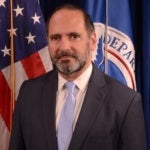If there is anything that the COVID-19 crisis has taught us, it is the importance of planning for future large scale risks. How can we change or use technology to better prepare for the looming crisis of climate change and other disasters?
Join Aspen Tech Policy Hub Fellows as they showcase their projects focused on the theme: Disaster Tech: Preparing for Unprecedented Crisis. Following the presentations of the projects, Carlos J. Castillo, incoming Chief Development Officer of Tidal Basin Group, gave further remarks.
The projects presented are:
Helpful Alternative Link Protocol: When disaster strikes, reliable and easy-to-use communications become absolutely critical. Dependable communications are needed to pair those in distress with those able to provide assistance. Alexander ‘RoRo’ Romero designed a project that aims to improve the resilience of cell networks and backup systems that are currently in use in a range of disaster-based situations.
Tech Companies Combating Climate Change: To avoid the worst effects of climate change, scientific consensus states that CO₂ emissions must decline 40 to 60 percent by 2030 to keep our planet from warming more than 1.5°C. To achieve these goals, the software industry, whose climate impact from cloud computing is often underestimated, must significantly change. Raylene Yung led a project that will help investors and startups with tools to understand the environmental impact of their cloud computing.
We were joined by:
 Carlos J. Castillo is the incoming Chief Development Officer of Tidal Basin Group, an expert consultancy in disaster preparedness & recovery. Most recently, Mr. Castillo was the Acting Deputy Administrator for Resilience at the Federal Emergency Management Agency (FEMA). In his nearly 40 year career in emergency and disaster management, Mr. Castillo oversaw FEMA’s Individual and Public Assistance Programs; led development of the Agency’s National Disaster Housing Strategy, working closely with other Federal partners following major disasters, including Hurricanes Katrina and Ike; and represented the U.S. internationally in disaster management at organizations such as the United Nations, the North Atlantic Treaty Organization, and the Asia-Pacific Economic Consortium.
Carlos J. Castillo is the incoming Chief Development Officer of Tidal Basin Group, an expert consultancy in disaster preparedness & recovery. Most recently, Mr. Castillo was the Acting Deputy Administrator for Resilience at the Federal Emergency Management Agency (FEMA). In his nearly 40 year career in emergency and disaster management, Mr. Castillo oversaw FEMA’s Individual and Public Assistance Programs; led development of the Agency’s National Disaster Housing Strategy, working closely with other Federal partners following major disasters, including Hurricanes Katrina and Ike; and represented the U.S. internationally in disaster management at organizations such as the United Nations, the North Atlantic Treaty Organization, and the Asia-Pacific Economic Consortium.
 Alexander ‘RoRo’ Romero is a Digital Services Expert at the Defense Digital Service and is the technical lead for the Hack the Pentagon Program. He was previously the CISO at the Defense Media Activity at the Department of Defense, and served in the Marines as an Electro-Optical Ordnance Repairer. Alexander has a Masters Degree in Information Systems with a focus in Computer Security from Strayer University. In his spare time he likes to run cybersecurity conferences, pick locks, punk self driving cars, and build electronic gadgets.
Alexander ‘RoRo’ Romero is a Digital Services Expert at the Defense Digital Service and is the technical lead for the Hack the Pentagon Program. He was previously the CISO at the Defense Media Activity at the Department of Defense, and served in the Marines as an Electro-Optical Ordnance Repairer. Alexander has a Masters Degree in Information Systems with a focus in Computer Security from Strayer University. In his spare time he likes to run cybersecurity conferences, pick locks, punk self driving cars, and build electronic gadgets.
 Raylene Yung was an engineering leader at Stripe where she led Payments, Product, and global expansion in Asia-Pacific. Prior to Stripe, she was an engineering director at Facebook and led efforts on privacy, content creation, and News Feed. She holds a BS and MS in Computer Science from Stanford University.
Raylene Yung was an engineering leader at Stripe where she led Payments, Product, and global expansion in Asia-Pacific. Prior to Stripe, she was an engineering director at Facebook and led efforts on privacy, content creation, and News Feed. She holds a BS and MS in Computer Science from Stanford University.
This conversation is part of the Aspen Tech Policy Hub’s Demo Day Video Series. Please visit our website to learn more about our series and RSVP for other events.

